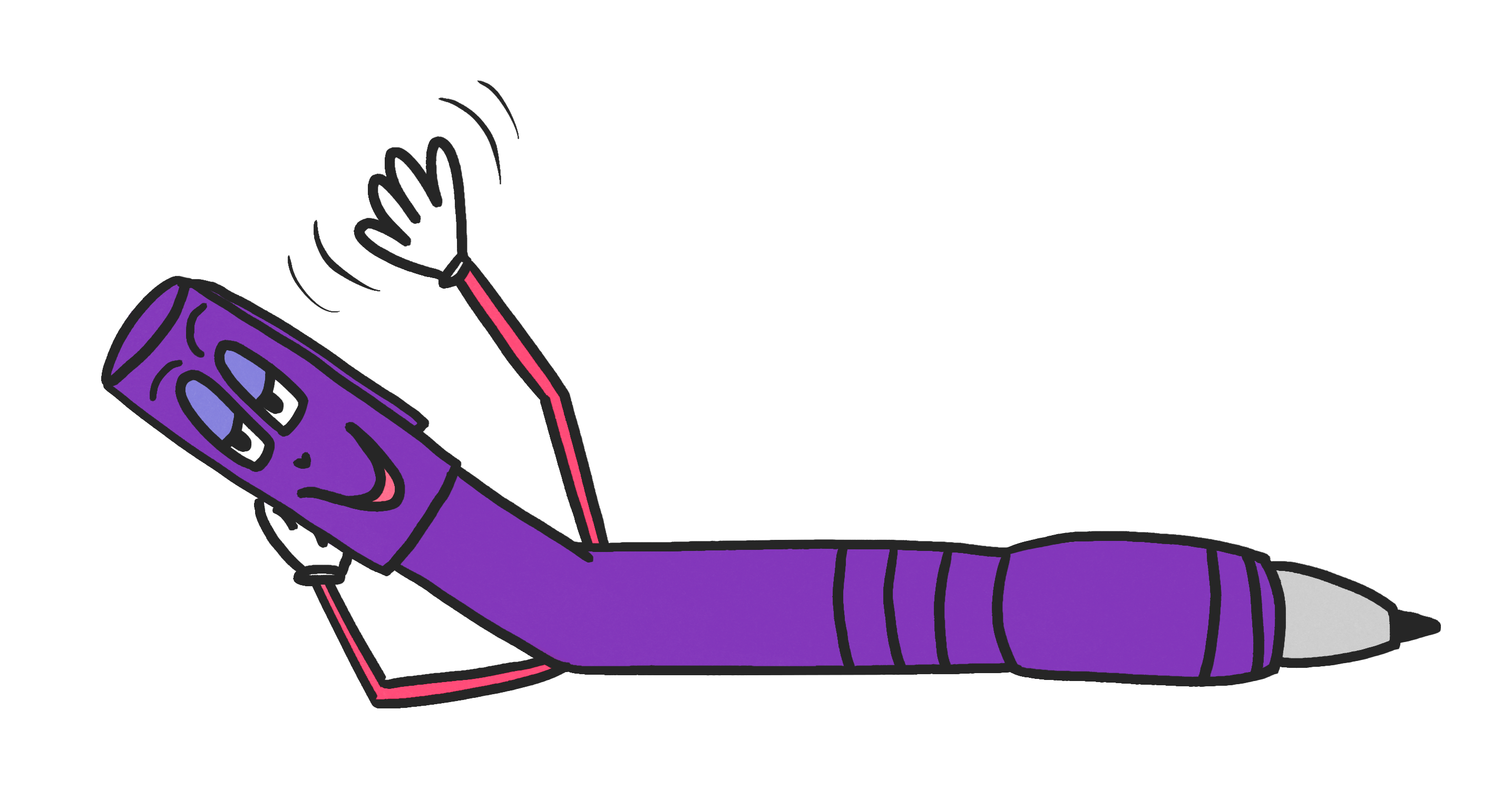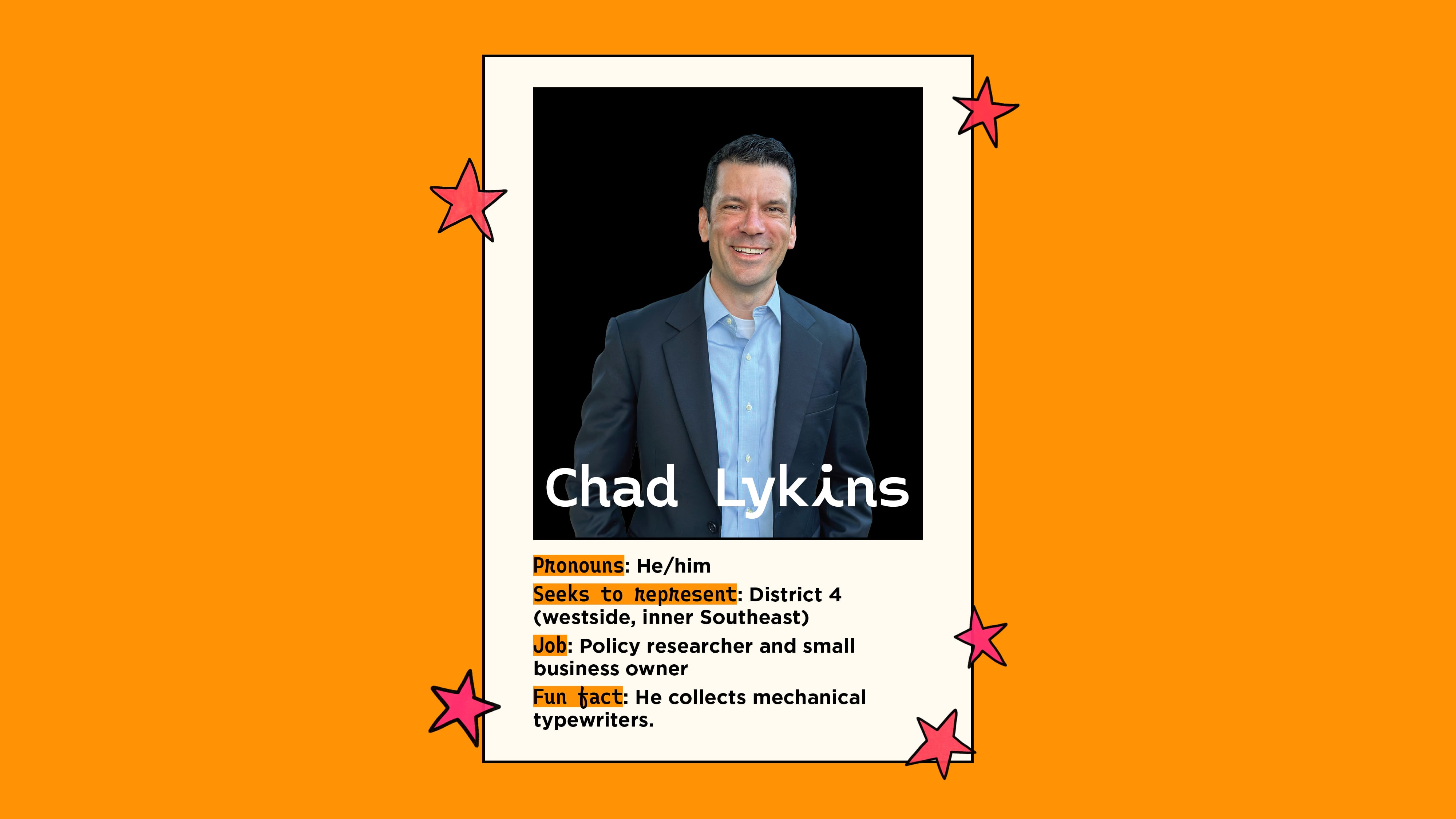Pronouns: He/him
Seeks to represent: District 4 (westside, inner Southeast)
Job: Policy researcher and small business owner
Fun fact: He collects mechanical typewriters.
Chad Lykins grew up in Alabama focused on finding money for meals and missing out on summer camps. His mom was a teenager when she had him, and she struggled with addiction. She eventually lost that battle, dying from multisystem organ failure when Lykins was 25.
After finishing high school, Lykins went to the College of Charleston and then earned a doctorate in leadership policy from Vanderbilt University. He then was an assistant professor at the University of Hong Kong for five years before moving to Portland 11 years ago.
In 2016, he started coaching chess to kids, and soon after founded Rose City Chess, a small business that provides after-school chess programs across Oregon and offers free entry to low-income kids so they can attend the camps he wished he had as a kid.
“We serve hundreds of families right inside this district and have been involved in the lives of more kids than any other candidate,” he tells WW. “They’re going through the same things that my family went through.”
Because his mother struggled with addiction, Lykins, 43, says he knows firsthand the importance of having treatment options.
“I have yet to find evidence that anybody is [getting] off of fentanyl or meth while living in a tent,” he says. “If we’re not sheltering people, it’s highly unlikely that we’re going to see folks recovering from addiction.”
He has received $40,000 in matching funds through the Small Donors Election program. Overall, his campaign has raised a little over $57,000 this year. He’s been endorsed by mayoral candidate Carmen Rubio and state Reps. Thuy Tran (D-Portland) and Mark Gamba (D-Milwaukie). He’s also been endorsed by the Portland Association of Teachers, Teamsters Joint Council 37, and IBEW Local 48.
We spoke to Lykins about his campaign. Questions and answers have been lightly edited for brevity and clarity.
WW: What are your top three priorities if elected?
Chad Lykins: Housing and homelessness are at the top of the list because implementing the right housing and homelessness strategy will help us progress on everything else I care about, whether it’s transportation, community safety, behavioral health, or addiction.
So really, housing homelessness is issues number one, two and three.
Beyond policing, what measures would you take to improve public safety in Portland neighborhoods?
I would start with the people who are most at risk, living without shelter and suffering from a toxic drug supply. Providing shelter on demand and treatment on demand would give us by far the greatest return on investment in terms of dollars spent on lives saved. Next would be expanding and fully funding Portland Street Response, hiring more police support specialists and disrupting gun violence.
How would you support local businesses and foster economic growth in Portland?
It’s clear that downtown is languishing, and it’s suffering from two major problems. The first is that there’s a large population of people downtown that are in immediate need of housing and treatment. We need to help them, rather than just chasing them from block to block. The second is that developers have turned downtown, unlike the neighborhoods that are thriving, into a monocrop of office buildings. Monocrops are not as resilient to hardship as a diverse ecosystem.
If we bring back residential and commercial lots, then we can bring back downtown. The city could also be acquiring land at a discount that might make building social housing pencil out.
What aspects of the city’s current approach to drug use and overdose deaths do you support and what would you change?
If we’re not sheltering people, it’s highly unlikely that they’re going to recover from addiction. We need shelter on demand, and we need treatment on demand that includes medication for opioid use disorders.
I’m deeply worried that we’re not deflecting people to treatment. It’s fiction. We already have 150 people a month who want treatment, who are going and begging for detox, and they’re being told that, sorry, we can’t help you.
With Measure 110 we said, instead of sending people to jail, we’re gonna have a public health approach. And then we didn’t do the public health approach. And now it’s the same thing with House Bill 4002; we’re saying, instead of going to jail, you can deflect the treatment. Except, again, there’s no treatment.
Flipping the switch between legal and illegal is good theater, but it’s not good policy. It’s largely fantasy to think that the legalization or criminalization of drugs helps people more than treatment, and treatment is the hard work.
Do you support the city staying in the Joint Office of Homeless Services? What’s your plan to address homelessness?
I support the city staying in the Joint Office. It is delivering more services to more people than it did a year ago. Executive director Dan Field is doing a good job, and the overall shelter strategy is finally tilting toward evidence-based approaches like the pod villages and motel shelters with wraparound services, counseling and job training.
How do you want police to respond to the riots in November if Trump wins?
We should learn from what Tom McCall did in 1970 at Vortex One. Start planning the logistics for keeping people and property safe. Go ahead and start issuing permits, renting equipment, scheduling medical and security staff, and planning street closures. If we do that, we can be a city that will respect our First Amendment rights without being a city in which every public gathering results in police beating protesters or protests devolving into riots.
How do you feel about the new structure of city government and ranked-choice voting?
This is the most exciting and interesting local election in the country, and the new structure will get some of the politics out of bureaus. It will give us a chance, for the first time in 120 years, for accountability, oversight and transparency.
Ranked-choice voting might get rid of the sort of winner-takes-all slash-and-burn politics that has defined at least the last couple of elections in Portland and lead to more collegiality.
See the other Portland City Council Candidates here!
 This article is part of Willamette Week’s Ballot Buddy, our special 2024 election coverage. Read more Ballot Buddy here.
This article is part of Willamette Week’s Ballot Buddy, our special 2024 election coverage. Read more Ballot Buddy here.

